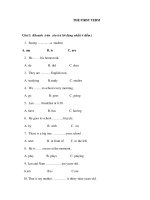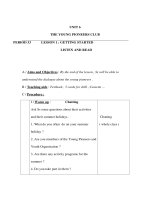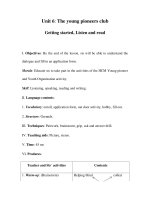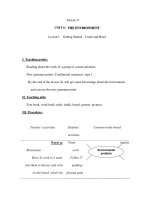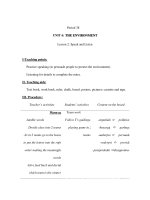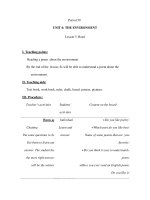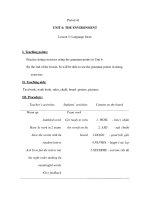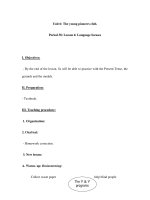WorkbookEdition 6 the accidental appliance
Bạn đang xem bản rút gọn của tài liệu. Xem và tải ngay bản đầy đủ của tài liệu tại đây (188.24 KB, 4 trang )
READTHEORY
Passage and Questions
Name________________
Date________________
• Reading Comprehension Assessment
Directions: Read the passage. Then answer the questions below.
The Accidental Appliance
Most people have used a microwave oven at some point in
their lives—indeed, almost every modern kitchen contains a
microwave. Microwave ovens help save time by allowing you to heat
food much more quickly than in a conventional oven. For example, it
takes 20-25 minutes to cook four slices of bacon in the oven; a
microwave will cook the same serving in only three minutes. A
baked potato takes 60 minutes to cook in the oven; the microwave
will cook it in eight. Microwaves are faster than conventional ovens
because of the way they heat the food. Conventional ovens cook by
means of conduction, where the heat passes from the outside of the
food to the inside of the food. Microwaves, on the other hand, work
in the opposite way. Microwave ovens work by shooting special
waves—called, of course, microwaves—through the food. When this
occurs, the water molecules within the food begin to move very quickly. As the water molecules collide
with one another, they create heat. This heat cooks the food from the inside, speedily transforming your
cold plate of leftovers into a steaming hot meal.
Although most people are familiar with the useful nature of microwave oven, not many know how
it was invented. It might surprise you to learn that the first person to discover the microwave’s potential for
quick cooking was not looking for a way to warm up his lunch—he was developing war technology.
Percy Spencer was a leading American scientist and engineer. During World War II, the United
States government hired Spencer to study magnetrons. Magnetrons are high-powered vacuum tubes that
produce the microwave radio signals used in radar devices. One afternoon while Spencer was working on
a magnetron, he noticed that the chocolate bar in his front pocket had melted. Curious about what had
happened, Spencer set up experiments where he used the magnetron to heat up other foods, including
popcorn kernels and an egg.
Spencer eventually attached a metal box to the magnetron, thus creating the first actual
microwave oven. He filed a patent for the device—originally called a Radarange—in 1945. The first
commercially available microwave oven weighed over 750 pounds, stood almost six feet tall, and cost
about $5,000. In contrast, the average microwave oven today weighs about 30 pounds, stands
approximately eighteen inches tall, and can be purchased for under $100.
Although Percy Spencer did not intend to invent the microwave oven, his inadvertent discovery
changed the way many people cook today. Just think—if Percy Spencer had not had a chocolate bar in
his pocket that afternoon, we might have never known the joys of a piping hot bag of microwave popcorn.
1) According to the passage, microwave ovens cook faster than conventional ovens because they
A. turn some of the molecules in the food into water molecules, which heat faster than other
molecules
B. use microwave radiation to heat all sides of the food at once
C. heat up the outside of the food first, allowing the heat to quickly move to the food’s insides
D. excite water molecules in the food, cooking the food from the inside
READTHEORY
Questions
2) Which of the following sentence would fit best in paragraph 4?
A. Magnetrons were important during World War II because of radar, which allowed for easier
detection of enemy planes and ships.
B. Although the first commercially-available microwaves were too large and expensive to be popular,
today, over 96% of American households have a microwave oven.
C. Microwave radiation can heat body tissue the same way it heats food. Exposure to high levels of
microwaves can cause a painful burn.
D. Silly Putty, the popular plastic clay children's toy, was also accidentally invented by a scientist
working for the American government during World War II.
3) The main purpose of this passage is to
A.
B.
C.
D.
inform readers about Percy Spencer, inventor of the microwave oven
compare the way a microwave oven cooks to the way a conventional oven cooks
discuss how the microwave oven was first invented
describe the ways that microwave ovens have changed throughout the years
4) As used in the final paragraph, the word inadvertent most nearly belongs to which of the following
word groups?
A.
B.
C.
D.
careful, calculated, deliberate
dangerous, hazardous, unsafe
brilliant, wise, intelligent
unplanned, accidental, unintentional
5) In paragraph 1, the author points out that “a baked potato takes 60 minutes to cook in the oven; the
microwave will cook it in eight.” This means that microwave users can save a lot of time cooking. In
what other ways has modern technology made everyday life more convenient? Think of at least one
technology and compare your life with that development to how your life would be without it.
_____________________________________________________________________________________________________________________________ _______________
__________________________________________________________________________________________________________________ __________________________
_____________________________________________________________________________________________________________________________ _______________
____________________________________________________________________________________________________________________________________________
_____________________________________________________________________________________________________________________________ _______________
_____________________________________________________________________________________________________________________________ _______________
__________________________________________________________________________________________________________________ __________________________
_____________________________________________________________________________________________________________________________ _______________
____________________________________________________________________________________________________________________________________________
_____________________________________________________________________________________________________________________________ _______________
____________________________________________________________________________________________________________________________________________
_____________________________________________________________________________________________________________________________ _______________
____________________________________________________________________________________________________________________________________________
READTHEORY
Questions
6) In paragraph 4, the author describes how the microwave oven became smaller and more affordable
over time. What modern technology do you think will one day be similarly obsolete? Explain your
hypothesis and your reason for believing it.
_____________________________________________________________________________________________________________________________ _______________
____________________________________________________________________________________________________________________________________________
_____________________________________________________________________________________________________________________________ _______________
_____________________________________________________________________________________________________________________________ _______________
_________________________________________________________________________________________________________ ___________________________________
_____________________________________________________________________________________________________________________________ _______________
_____________________________________________________________________________________________________________________________ _______________
__________________________________________________________________________________________________________________ __________________________
_____________________________________________________________________________________________________________________________ _______________
____________________________________________________________________________________________________________________________________________
_____________________________________________________________________________________________________________________________ _______________
7) Paragraph 2 mentions that the microwave oven was originally discovered during research on war
technology. Research on the atomic bomb helped lead to advances in cleaner energy technology.
Military spending also helped created the Internet. Still, many people argue that too much money is
spent on the military. How does learning about these “accidental” military discoveries influence your
opinion on military spending? Does it impact your position at all? Briefly explain your feelings below.
____________________________________________________________________________________________________________________________________________
_____________________________________________________________________________________________________________________________ _______________
____________________________________________________________________________________________________________________________________________
_____________________________________________________________________________________________________________________________ _______________
______________________________________________________________________________________________________________________________________ ______
___________________________________________________________________________________________________________________________ _________________
_____________________________________________________________________________________________________________________________ _______________
_____________________________________________________________________________________________________________________________ _______________
__________________________________________________________________________________________________________________ __________________________
_____________________________________________________________________________________________________________________________ _______________
_____________________________________________________________________________________________________________________________ _______________
_____________________________________________________________________________________________________________________________ ______________
READTHEORY
Answers and Explanations
1) D
Question Type: Detail
In the first paragraph, the author explains how microwave ovens work. The author notes that “microwaves are faster than
conventional ovens because of the way they heat the food …. Microwave ovens work by shooting special waves—called, of course,
microwaves—through the food. When this occurs, the water molecules within the food begin to move very quickly. As the water
molecules collide with one another, they create heat. This heat cooks the food from the inside.” By causing the water molecules
inside the food to move, the microwave heats the food from within. This makes the food cook faster than it would in a conventional
oven. Therefore (D) is correct. The passage does not provide information to support choices (A), (B), or (C). Therefore they are
incorrect.
2) B
Question Type: Inference
Paragraph 4 describes the first microwave oven and then explains how it is different from its modern counterpart. The author says
that the first microwave “weighed over 750 pounds, stood almost six feet tall, and cost about $5,000,” whereas today’s models take
up much less space and cost much less. Because the early microwaves were so large and expensive, it is likely that few people
were able to buy them. Today’s models are much cheaper and more conveniently sized, so many more people have them in their
homes. This idea is not explicitly mentioned in paragraph 4, but it would fit in well with the other information in that paragraph.
Therefore (B) is correct. Based on the above information, we can see that paragraph 4 is about how the first microwave oven is
different from modern microwave ovens. Paragraph 4 mentions a magnetron, but does not discuss its use in World War II.
Information about the use of magnetrons in World War II would likely fit best in paragraph 3. Therefore (A) is incorrect. Although it
might be true that microwaves can be dangerous, this information does not fit in with paragraph 4, which is about how the first
microwave oven is different from modern microwave ovens. Therefore (C) is incorrect. The invention of Silly Putty has a lot in
common with the invention of the microwave—both were discovered accidentally by American scientists working for the government
in World War II. Although this information does relate to ideas in the passage as a whole, it does not fit in paragraph 4, which is
about how the first microwave oven is different from modern microwave ovens. Therefore (D) is incorrect.
3) C
Question Type: Global
The main idea of this passage is first introduced in paragraph 2, where the author writes: “Although most people are familiar with the
useful nature of microwave oven, not many know how it was invented.” Next, the author describes how Percy Spencer discovered
that microwave rays from the magnetron could heat food up very quickly. The author then explains how Spencer used this
accidental discovery to create the first microwave oven. In the final paragraph, the author writes: “Although Percy Spencer did not
intend to invent the microwave oven, his inadvertent discovery changed the way many people cook today.” Although the author
discusses several aspects of the microwave oven in the passage, the majority of the passage is about how the microwave oven was
invented. Therefore (C) is correct. Although Spencer is important to the passage because he invented the microwave oven, the
author does not give very much background about his life. The only real information we get about Spencer is in paragraph 3, where
the author describes him as “a leading American scientist and engineer.” We do not learn very much else about him, so it is not
likely that the main purpose of the passage is to provide information about Percy Spencer. Therefore (A) is incorrect. Although the
first paragraph explains how microwave and conventional ovens cook food, the rest of the passage mainly discusses the invention
of the microwave oven. Comparison between the microwave oven and conventional oven is limited to the first paragraph, so it is not
likely to be the main purpose of the passage. Therefore (B) is incorrect. In paragraph 4, the author describes the first commerciallyavailable microwave and compares it to the average modern model. The author writes: “The first commercially available microwave
oven weighed over 750 pounds, stood almost six feet tall, and cost about $5,000. In contrast, the average microwave oven today
weighs about 30 pounds, stands approximately eighteen inches tall, and can be purchased for under $100.” Here, the author gives
some basic information about the very first microwave ovens and the ones we are familiar with today. The author does not mention
all of the microwave ovens that were developed in the years between 1945 and today. The author does not truly describe how
microwaves have changed throughout the years. Furthermore, a discussion of the difference between 1945’s microwave ovens and
today’s microwave ovens is limited to the last paragraph, so it is not likely to be the main purpose of the passage. Therefore (D) is
incorrect.
4) D
Question Type: Vocabulary
inadvertent (adjective): unintentional; not planned or intended.
In the last paragraph, the author writes: “Although Percy Spencer did not intend to invent the microwave oven, his inadvertent
discovery changed the way many people cook today.” We can use context clues—hints from known words or phrases around the
unknown word or phrase—to help us figure out what the word inadvertent most nearly means. Here, the author states that Spencer
“did not intend to invent the microwave oven.” In other words, Spencer was not purposefully trying to invent something that would
cook his food faster when he discovered that microwaves could heat food. This means that his discovery was not planned and not
done on purpose. Based on this information, we can see that we are looking for words that mean unplanned or accidental.
Therefore (D) is correct. Based on the above information, we can see that we are looking for words that mean unplanned or
accidental. Careful, calculated, and deliberate mean the opposite of unplanned or accidental. Therefore (A) is incorrect. Based on
the above information, we can see that we are looking for words that mean unplanned or accidental. Dangerous, hazardous, and
unsafe do not mean unplanned or accidental. Therefore (B) is incorrect. Based on the above information, we can see that we are
looking for words that mean unplanned or accidental. Spencer’s invention might have been brilliant, wise, and intelligent, but the
author is not describing it in that way in the last paragraph. Therefore (C) is incorrect.

